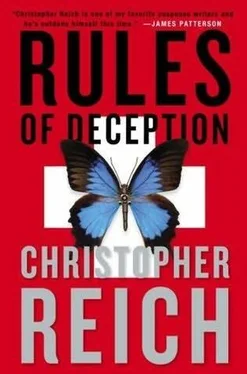In the hall, he slowed long enough to see the police cars next to the curb, officers with guns drawn rushing the house. A short, determined man in a black overcoat was leading them up the gravel path.
Police? Where was the ambulance he’d phoned?
Questions. Too many questions.
Jonathan ran through the house, catching up to Simone at the back door. Grabbing her hand, he pulled her through the garden.
“Where are we going?” she asked, struggling to keep up with him. “The car’s the other way.”
“Forget the car. We can come back for it.”
They didn’t stop at the dirt road, but continued up the hillside. Ignoring the wind and the rain and the chest-high brush, Jonathan carved a path to the crest. Simone huffed and wheezed and swore, but somehow she stayed with him. When he finally looked back, they’d gained four hundred feet in altitude and the villa was a half mile away.
“I can’t go on,” said Simone, clamoring for breath. “I need to rest.”
But it was Emma’s voice he heard, and for a moment, he swore he saw her, dressed in red and black, standing on the slope beneath them. He grabbed Simone’s hand. “Come on,” he said. “There’s only one way.”
And clutching the briefcase to his chest, he turned and headed higher into the mountains.
Milli Brandt walked briskly down the snowy path, surrounded on both sides by tall, manicured hedges. In better times, she had enjoyed visiting the gardens of Schönbrunn Palace. Stretching more than a mile in each direction, the immaculately groomed grounds spoke of an earlier era when royalty meant unbridled power. For good and evil.
It was shortly after her arrival from Israel that she had first visited the palace gardens. Along with her parents and her sister, she had spent the day walking from one end of the grounds to the other, climbing the hill to the Gloriette, the immense colonnade built in 1775 by the Emperor Joseph and his wife, Maria Theresa. Even then, the two girls had been ambitious. Milli dreamed of being a prominent judge. Tovah had planned a career as a diplomat. Of the two, Tovah was quicker to achieve her goals. By the age of twenty-five, she had moved back to Jerusalem and earned a position as a spokeswoman for the Israeli Foreign Ministry. Married and the mother of a baby girl, she was a regular fixture on the nightly news.
One evening, Tovah and her husband drove to Tel Aviv to enjoy a seafood dinner at one of the fine restaurants that lined the coast. She was in a celebratory mood. Earlier that week, her doctor had informed them that she was pregnant with a second child.
Realizing that it might be their last chance in a long while, they decided to go dancing at Teddy’Z, an outdoor discotheque. Sometime near midnight, a tanned, handsome youth named Nasser Brimm entered the disco and pushed his way to the center of the dance floor. By the time anyone noticed that his formal attire and woolen blazer were out of place for a sultry spring evening, it was too late.
Afterward, the police figured that Tovah had been standing next to the bomber when he had detonated his belt charge of C-4 plastique layered with thousands of nails, nuts, and bolts. Her head, strangely unscathed, was the only part of her body ever found.
The death toll for the attack counted sixteen young men and women. Two others were blinded. A third lost both his arms. A fourth was paralyzed from the neck down. In fact, the final toll was higher. No one had counted the new life growing in Tovah’s womb.
“Miss Brandt.”
Milli spun at the sound of the deep, accented voice. A slim, academic-looking man stood a few feet behind her, smiling. She had not heard him approach. “Mr. Katz?”
“I see you have the paper. I appreciate your following our directions.”
The man linked arms with her, and in the manner of husband and wife, they strolled through the deserted gardens. As they walked, Milli informed him about the emergency meeting held in the Viennese woods the night before and the findings delivered by Mohamed ElBaradei.
“Enriched to ninety-six percent. You’re certain about that?”
Milli said that she was.
“And what chance is there of an error in measurement?”
“It would be the first time. I’m sorry to bring such news. I thought it was my duty.”
“‘Every subject’s duty is the king’s; but every subject’s soul is his own.’ I’m alone on this, but I’m convinced Shakespeare was a Jew.” A timid smile as he stopped and turned to her. “No one likes to betray a trust.”
Milli watched the tall, thin figure disappear among the snowcapped topiaries. A sharp wind stirred, filling her ears with the rush of desolation. She’d expected him to say that she’d done the right thing. She wanted a speech about how he would take immediate action and that she had saved thousands of lives, but he’d said none of those things.
In parting, he simply requested that she call the number she’d been given should she learn anything of further importance. Not even a thank-you.
“Is it him?”
Von Daniken compared the snapshot of Gottfried Blitz standing next to the drone with the ruined face lying at his feet. “You tell me,” he said, handing the photo to Kurt Myer and turning away before the bile rose any farther in his throat.
“Same sweater. Same eyes. It’s him.” Squatting on his haunches, Myer studied the corpse with an expert’s keen eye. “He was killed while seated in the chair, then moved to the floor. The shot had to be taken at waist level with the muzzle aimed downward to have expelled Blitz’s brains all over the desk and wall.”
Using a fountain pen, he pointed to the rash of gunpowder tattooed into the skin. “Look at the abrasion collar and the stippling. The shooter was a foot away when he pulled the trigger. Blitz didn’t even know he was there. He was working on his laptop until the moment he was shot.”
But von Daniken was interested in something else Myer had said. “Back up a second, Kurt. What do you mean ‘moved to the floor’? Are you saying the killer shot him, then laid him on the carpet? Did he bring him the towels, too?”
“Someone did. It certainly wasn’t Mr. Blitz.” Myer tested the pile of towels heaped near the body. “Still warm.”
The men shared an uncomfortable glance.
From the street came the sound of another siren approaching. Doors slammed. There was a commotion in the hall. Two paramedics entered the study.
“That was quick,” said von Daniken, referring to the near instantaneous arrival of the medical technicians.
“Did you call?” one of the paramedics asked. “Dispatch said it was an American.”
“An American?” Von Daniken traded looks with Myer. “How long ago did the American call?” he asked the paramedic.
“Twelve minutes ago. Nine-oh-six.”
“It’s him,” said Myer. “Ransom.”
Von Daniken nodded, then glanced at his watch. During the drive from the airfield, he’d called Signor Orsini, the station manager, for a description of the man who’d shown up at his door early that morning impersonating a police officer and asking about who had sent a certain pair of bags to Landquart. Afterward, he’d phoned the Graubünden police for details about the murder of one of its officers the day before, also in Landquart. Orsini’s description perfectly matched that given by a witness to the crime. The police in Landquart even had a name: Dr. Jonathan Ransom. An American. There was more. Ransom’s wife had perished two days earlier in a climbing mishap in the mountains near Davos.
“If it was Ransom who called,” he said to Myer, “that explains the towels. He’s a doctor.”
Читать дальше












